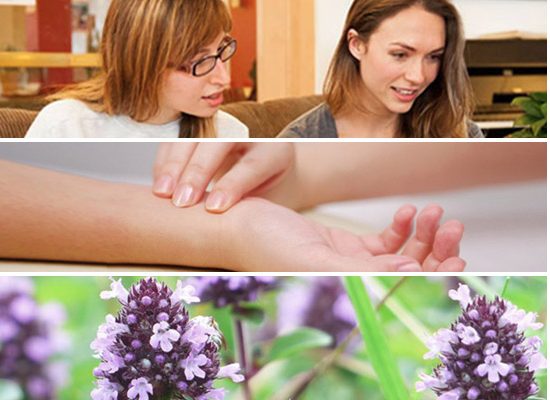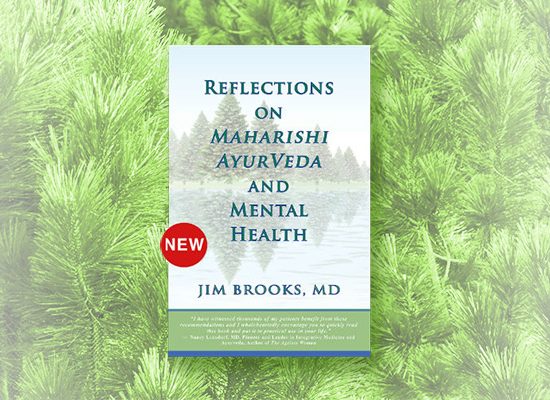Have you experienced better health, greater mental clarity, improved mood or relationships as a result of learning the Transcendental Meditation® (TM) technique? You’re in good company! Millions of TM meditators worldwide have experienced better mental, emotional, and physical health, as hundreds of scientific studies have shown. The profound rest gained from TM practice dissolves stress of all kinds, and also reduces anxiety and depression.

Meditators often find that previously stressful issues don’t bother them like they used to. This calm and stability are signs of less stress and greater inner silence. Yet sometimes life can still be stressful and challenging.
Fortunately, the ancient health system of Maharishi AyurVeda® has a multitude of practical aids that also balance the emotional heart, promote the growth of consciousness, and help us feel even better on a daily basis.
How to Give Your Emotional “Digestion” a Tune-Up
Emotional balance relies on processing thoughts and emotions in a timely way. If we’re able to process emotions quickly, we can let go of a situation or memory and get on with our lives. But if we process emotions slowly, stress from an event can persist as a lasting impression in the mind and nervous system. This lingering stress or unprocessed emotion might stimulate low moods or even feelings of despair and other emotional problems.
Lucky for us, there are easy ways to improve our emotional metabolism.
Just as we can improve our digestion of food, we can also tune up our emotional “digestion.” According to Ayurveda, our emotional digestion is set by a particular aspect of the pitta Supersystem or dosha. This aspect of pitta dosha is called sadhaka pitta. It provides the “fire” to convert our thoughts, memories, and experiences into emotions.
If that fire is strong, we can process emotional stress very quickly and with minimal long-term effects. But if our emotional metabolism is slow or weak, our minds and hearts may hang on to old hurts, and they may continue to affect us. Lucky for us, there are easy ways to improve our emotional metabolism.
Quick Quiz with 5 Tips for Your Emotional Type*
According to Ayurveda, our emotional metabolism tends to fall into one of three “types.” These are related to the predominance or imbalance of one of the three doshas, or underlying Supersystems of the mind and body.
These types can be characterized as “variable fire” vata, “high fire” pitta, and “low fire” kapha. Knowing and balancing your emotional type can help you maintain your emotional intelligence and bliss, even in the most trying circumstances.
To find your emotional type, check each description below that applies to you. The interactive form will sum your score. Then view the emotional tips for any type where you score two or more. Following these tips will help you “follow your bliss.”
Are You a “Variable Fire” or Vata Emotional Type?
2 Total — 2 or more means you're a “variable fire” or Vata emotional type
Show Hide TIPS for Vata Emotional Type
5 Tips for Balancing Vata, the “Variable Fire” Type
TIP 1 How to balance your tendency to worry and feel anxious: Be regular in your practice of TM to reduce your stress levels, and enjoy Maharishi YogaSM Asanas (positions) and pranayama, an easy breathing exercise. (Check with your local TM Center to learn these practices.)
TIP 2 How to balance your tendency to restlessness and anxiety: Give yourself a daily oil massage before your bath or shower.
TIP 3 Routine: Follow a regular routine of sleeping, practicing TM, and eating—this is very important for your type. Also try to get to bed early, by 10:00 p.m.
TIP 4 Herbs: Some helpful herbal supplements for your type are Valerian, Gotu Kola, Brahmi, and Ashwagandha. Two Maharishi AyurVeda supplements I recommend are Worry Free® and Stress Free Mind®. Visit this page for your Enjoy TM News discount ►
TIP 5 Work and Communication: Do one thing at a time, in a settled, quiet environment. Take an extra moment to organize your thoughts before you talk.
Are You a “High Fire” or Pitta Emotional Type?
2 Total — 2 or more means you're a “high fire” or Pitta emotional type
Show Hide TIPS for Pitta Emotional Type
5 Tips for Balancing Pitta, the “High Fire” Type
TIP 1 How to balance your tendency to feel angry and irritable: Be regular in your practice of TM to reduce your stress hormones, and enjoy Maharishi YogaSM Asanas (positions) and pranayama, an easy breathing exercise. (Check with your local TM Center to learn these practices.)
TIP 2 How to balance your body’s tendency to “overheat”: Eat a pear every day. Enjoy wholesome, cooling foods that reduce acidity and inflammation—fresh organic vegetables and sweet juicy fruits (6–8 servings/day). Avoid hot (spicy), fermented, or sugary foods, as well as vinegar, sour condiments, excess caffeine, alcohol, and smoking.
TIP 3 Routine: Eat your meals on time, especially lunch. Never skip or delay your meals. Take time in nature and with family and friends to avoid overworking and reduce stress. Enjoy roses in your home and use rose water, both on your skin and in your diet.
TIP 4 Herbs: Some helpful herbal supplements for your type are Holy Basil (Tulsi), Shankapushpi, and Arjuna. One Maharishi AyurVeda supplement I would recommend is Stress Free Emotions®. Visit this page for your Enjoy TM News discount ►
TIP 5 Work and Communication: Make sure you have eaten a meal or snack before engaging in important or contentious conversations.
Are You a “Low Fire” or Kapha Emotional Type?
2 Total — 2 or more means you're a “low fire” or Kapha emotional type
Show Hide TIPS for Kapha Emotional Type
5 Tips for Balancing Kapha, the “Low Fire” Type
TIP 1 How to dissolve the backlog of emotional stress that your generous and nurturing heart has accumulated: Be regular in your practice of TM to reduce your stress levels, and enjoy Maharishi YogaSM Asanas (positions) and pranayama, an easy breathing exercise. (Check with your local TM Center to learn these practices.)
TIP 2 How to balance your tendency to feel depressed, sad, or lethargic: Take a morning walk in the rising sun. Exercise at least 45 minutes a day.
TIP 3 Routine: Get up by 6:00 a.m. for more energy and lightness during the day.
Eat your heaviest meal at noontime, and a lighter, vegetarian evening meal, without cheese or yogurt, by 7:00 p.m.
TIP 4 Herbs and spices: Sip hot water with fresh ginger root and a leaf of basil in it. Add ginger, black pepper, mustard seed, fresh Italian herbs, coriander, cumin, and turmeric to your diet. I would also recommend the herb Arjuna and the Maharishi AyurVeda supplement Blissful Joy®. Visit this page for your Enjoy TM News discount ►
TIP 5 Lifestyle and Communication: Spend time with friends and family. Avoid time alone. Learn to “let go” and move on.
After taking the quiz you may find that you are a mix of emotional types—most people are! If you’re wondering which tips to follow, decide which imbalance is the most important to you to improve. Is it worry, anger, or sadness? Then focus on the tips for that type.
Two Secret Weapons for Emotional Well-Being
As with most health issues, our emotional metabolism—our ability to “digest” experience—is partly inherited, and partly determined by environmental factors. But the exploding field of epigenetics tells us that we can make a dramatic impact on our mental, emotional, and physical health. How? By the lifestyle choices we make each day.
Fortunately, we have two secret weapons to enhance our emotional well-being. The first is the TM technique, which actively dissolves stress and tension from the nervous system. Our TM practice also refines the emotional heart and supports the full development of our potential, including enlightenment.
The second secret, from Maharishi AyurVeda, lies in identifying and fine-tuning our emotional metabolic type. Once we know our type, we can adjust our diet, lifestyle, and routine accordingly for optimal balance and bliss.
“Wired for Bliss”
According to the Vedic tradition, our nervous systems are “wired for bliss.” This means that our mind-body system is the hardware for an enlightened life—one of harmony, unity, love, and bliss.
Be sure to be regular in your TM practice, and feel free to follow these timeless tips for mind-body balance from Maharishi AyurVeda. Together, they’ll help you realize your full bliss potential and claim the natural high that is your birthright!
When the emotional heart is balanced, one gains pure knowledge, the desires of the mind are always righteous, and one experiences unbounded bliss. —Sushruta Samhita, ancient Ayurvedic text
* If you have a health condition or take medication, please consult your physician before adopting any new dietary recommendations. Although unlikely, if any discomfort occurs, discontinue the above recommendations.
Best-selling author Dr. Nancy Lonsdorf, M.D., has been an Ayurvedic practitioner for more than 30 years and is recognized as one of the nation’s most prominent Ayurvedic doctors. She teaches Maharishi AyurVeda® in affiliation with the Academy of Integrative Health and Medicine and the University of Maryland School of Medicine’s Center for Integrative Medicine. A frequent speaker on national media, she continues her private practice in integrative medicine and Ayurveda, including Wellness Consultations in person or by phone. For more information on Dr. Lonsdorf’s practice, visit www.drlonsdorf.com. To schedule an Ayurvedic Wellness Consultation by phone or teleconference, please contact Dr. Lonsdorf’s office at 641-469-3174 or healthoffice@drlonsdorf.com.
Copyright 2017, Nancy K. Lonsdorf, M.D. All rights reserved. Do not reproduce without written permission of the author.







It doesn’t matter what’s going on in life, I experience a very settled state of equanimity at all times.
My mind is fast, and my reactions are quite quick. I feel optimistic most of the time and feel very stable. I deal with stress well. I think on my feet. I am generally happy. I am sensitive but it is not overwhelming. I am also intuitive as well as intellectual. I am interested in everything. I didn’t see my type there.
Thanks for your comment, Jonathan. I’m not an Ayurvedic practitioner, but from my layperson’s perspective it sounds like your Supersystems are in balance, and the positive expressions of Pitta, Vata, and Kapha characteristics are in harmony. Congratulations, and keep up your beneficial lifestyle!
This is a helpful and thought-provoking article.